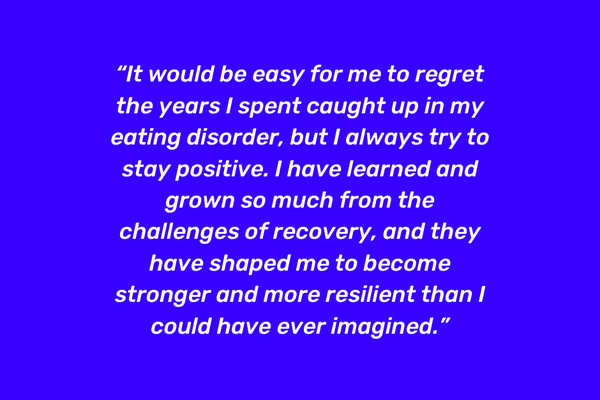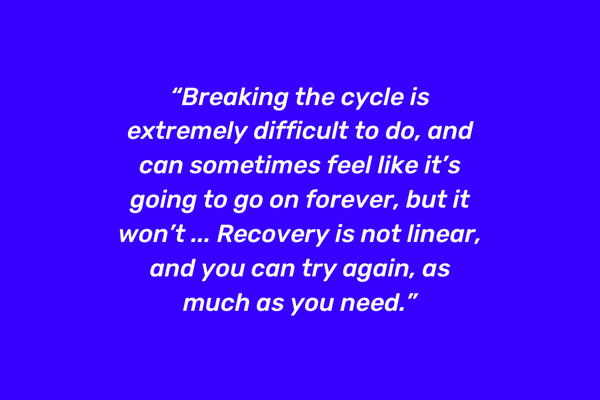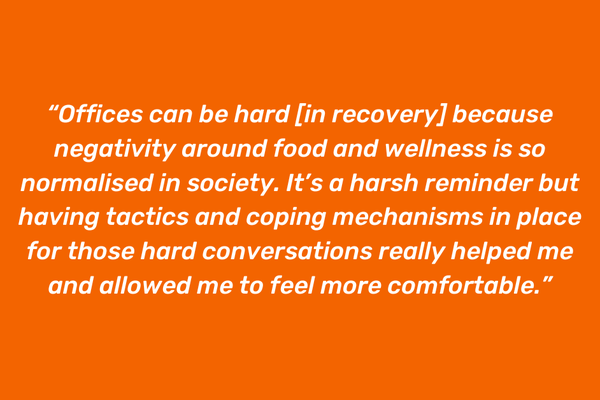There are so many aspects to experiencing an eating disorder, each of which could be a blog post in its own right. Instead, I am sharing my story in the hope that others may find it relatable or helpful in their own recovery journeys. I also hope to show readers that recovery is possible, even after a long illness, and despite the times where you may feel like giving up (I have definitely felt this way at times).
My eating disorder started in earnest when I was at university, although I had some disordered tendencies long before this time. Being away from home and fending for myself, I was able to control my food more, and avoided buying foods (or quantities of food) that felt unsafe. I also suffered from irritable bowel syndrome (IBS), which made me feel constantly bloated with very little appetite. Although I now believe these symptoms were mainly linked to stress rather than diet, I fell down the slippery slope of cutting out certain foods, mistakenly hoping this would cure my symptoms.
My eating further deteriorated during my second year of university, after which point I embarked on a placement year in a big city as part of my degree. This proved a very difficult year. I was completely out of my element in a city environment. My placement was also challenging and this led to a spiral of anxiety about my whole career and future. I felt completely lost and hopeless. Meanwhile, my food restriction continued until I was eventually hospitalised.
Although frightening, an inpatient admission was absolutely what I needed at the time. I had been receiving outpatient treatment and I did want to recover, however improving largely of my own volition felt completely impossible. Once in hospital, I felt I had no choice but to eat according to my meal plan, and I gradually restored weight while continuing with therapy. During one particular therapy session, I had a breakthrough moment with my anxiety when my therapist enabled me to get some perspective and realise that all hope was not lost.
After a few months, I transitioned to a day programme, then back to outpatient treatment and was later fully discharged. I gladly returned to my studies and extracurricular activities; fortunately, my university was accommodating and allowed me to pass my placement despite having spent a significant proportion of the year in hospital.
After a few years of very gradual ups and downs, I could see that I was starting to decline once more and asked to be referred back to an eating disorder service. In a turn of events, I then began to make some real progress, even while still on the waiting list. I still don’t fully understand how this came about. I felt overwhelmed by changes in appetite, physical changes, and by trying to manage an anxiety flare-up alongside daily life and work. However, I also became more focused on eating to stabilise my energy, to better allow me to work and take part in enjoyable activities. I’d also had enough of cycling in and out of my disorder and fearing for my health.
Another positive step towards recovery has been opening up to trusted friends. Previously, battling my eating disorder had felt like carrying a huge burden or secret. This was isolating and stressful, so sharing with others and receiving their support was a big relief. I have also attended Beat’s online peer support groups, which have allowed me to connect with others and to give and receive encouragement and advice.
Over the past few months, I have been working with a dietician and I am now starting therapy for both my anxiety and eating disorder. After making a promise to myself, I am striving to be completely honest with my treatment team and not shy away from topics I find difficult (and which may have gone unaddressed in previous treatment). While there is still work to do, I have recently seen some real improvements: I rarely look at food labels, find deciding what to eat much easier, and the constant thoughts about food (“food noise”) have reduced - even though I thought they never would! My appetite is more reliable, and I am learning to acknowledge the more subtle signs of when my body needs fuel.
I now feel closer to a stable recovery than I ever have before. It has taken almost a decade to get to this point, but perhaps I wasn’t fully ready to commit to recovery until now. I do not know whether my future self will be free from disordered thoughts, or still have these thoughts but quieter and more manageable. What I am sure of is that I will come out the other side so much stronger!
If you've been affected by any of the issues raised in this story, or are concerned for yourself or a loved one, you can find support and guidance on the help pages of our website.
Help us change lives
Donate today to help us provide more vital support to people who are affected by eating disorders.
Finding me again in eating disorder recovery - Georgia’s story
30 January 2025Rebuilding your identity in recovery can be daunting - here I share some tips that helped me find the old and new me in recovery
‘Recovery is not linear’ - Ella's story
26 April 2024Ella shares her experience of recovery and looks back at how far she's come.
Tackling the office with an eating disorder - Sophie's tips
22 April 2024Our supporter Sophie shares her tips on how to navigate the office while in recovery.


